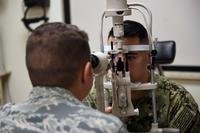The following post was originally featured on the VA's VAntage Point blog.
By Alex Horton
Rumor mills are permanent fixtures in schools, offices and wherever people congregate, and most of the time they’re pretty innocuous. But myths and rumors that deal with health–in this case Veterans health–are a serious matter that can prevent qualified Vets from seeking the care they both need and deserve. Many have come up in the comments section, and others I hear from the guys in my old unit. The myths won’t die unless they are addressed publicly and clearly, so we present you with the most common we hear, and the straightforward answers they need.
Five Myths About VA Health Care
Myth Number One - I wasn’t injured in the service, so I’m not eligible for VA health care.
Status: False -
One of the most common myths revolves around eligibility for health care at VA. Many think that you have to first establish a disability rating before you can start to make appointments, see doctors and receive medication. That is not the case. If you served in the military, even during peace time, and were honorably discharged, you likely qualify for VA care. Even if you don’t meet those requirements, special circumstances might apply, like Vietnam service, exposure to Agent Orange and household income. The best way to find out if you qualify is to submit an application for health benefits. You can fill one out online or at a VA Medical Center. If you are an Iraq or Afghanistan Veteran, there are special combat Veteran benefits from VA, like temporary access to dental care and guaranteed access to Priority 6 for five years (unless you are eligible for a higher priority group). See the priority enrollment groups here.
Also, if new regulations are established regarding health benefits, VA will automatically reassess your case if it’s on file.
Myth Number Two - I can only receive care for service connected injuries.
Status: False -
You can receive VA hospital and outpatient care for any ailment, service connected or not if you are enrolled in the VA healthcare system, but you may have to pay a copayment. For example, if a Veteran is service-connected for a bad knee, any VA hospital and outpatient care and medication for the knee is free of charge. However, if the same Vet goes into surgery to remove an appendix and it’s not service connected, he may be subject to a co-pay depending on the amount of his disability rating and other factors. Familiarize yourself with co-pay guidelines and rates.
A small number of Veterans, such as those with bad conduct discharges that VA has determined were issued under conditions other than honorable and who are not subject to certain statutory bars to benefits, can only be treated for their service connected disabilities and nothing else. If one of those Vets is service connected for their left foot, they can only use VA health care for their left foot and nothing else.
Myth Number Three - I make too much money to qualify for VA health care.
Status: It depends -
If you do not have a service connected disability, you may want to use VA’s financial calculator to see if you qualify for free VA care, medication and travel benefits. If your income is too high (over a maximum income level set every year), you may have to pick up the tab for traveling and receive your care and medication by paying a co-pay. Recently, the rules have been changed for Priority 8 Veterans to permit more of them to enroll for VA health care. Go here for more information and an income calculator to see if you qualify under the new rules.
Myth Number Four - I can’t use VA health care if I have private health insurance.
Status: False -
From VA’s Health Eligibility Center Director Tony Guagliardo:
“We strongly encourage Veterans to receive all your health care through VA. However, if you choose to receive treatment from private doctors, VA will work with them to meet your health care needs and coordinate effective treatment. We call this Co-managed Care or Dual Care — which means that your VA and private doctors will work together to provide safe, appropriate, and ethical medical care.”
Myth Number Five - If I’m 100 percent disabled, that means I’m permanently disabled
Status: False -
You could have a 100 percent disability rating as a temporary status while you undergo surgery, and have it reduced to its previous rating after you heal. 100 percent doesn’t necessarily stay with you.
# # # # #
My hope is that this information sheds a little light on the sometimes confusing realm of VA medical care. These myths and answers are very general, but we hope to receive more specific questions in the comment section. We look forward to dispelling myths about other parts of VA as well.
Alex Horton



